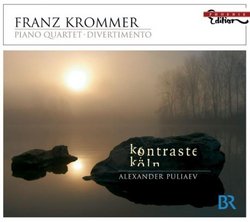| All Artists: Franz Krommer, Kontraste Köln, Alexander Puliaev Title: Franz Krommer; Piano Quartet; Divertimento Members Wishing: 0 Total Copies: 0 Label: Phoenix Edition Original Release Date: 1/1/2008 Re-Release Date: 7/29/2008 Album Type: Hybrid SACD - DSD Genre: Classical Styles: Chamber Music, Historical Periods, Classical (c.1770-1830) Number of Discs: 1 SwapaCD Credits: 1 UPC: 811691011066 |
Search - Franz Krommer, Kontraste Köln, Alexander Puliaev :: Franz Krommer; Piano Quartet; Divertimento
 | Franz Krommer, Kontraste Köln, Alexander Puliaev Franz Krommer; Piano Quartet; Divertimento Genre: Classical
|
Larger Image |
CD Details |
CD ReviewsFranz Krommer Deserves Better... Giordano Bruno | Wherever I am, I am. | 11/22/2009 (3 out of 5 stars) "... than to be a forgotten composer, billed as a "contemporary of Mozart". He's a much finer and more distinctive composer than that billing suggests, and the two works on this CD are among his best, both composed in his full maturity. Franz Krommer was born in 1759, three years after Mozart, and died in 1831, four years after Beethoven. Thus his stylistic evolution appropriately stretches from Haydn to Schubert, but at no point in his career was he a mere imitator. The fame and success he enjoyed, and the tranquillity of his career as one of the last "court composers" - serving the Hapsburg Emperor Joseph I for much of his lifetime - make him a less 'dramatic' figure than Mozart, Beethoven, or Schubert, but not necessarily a less profound composer. He's best known these days for his several clarinet concertos, but his symphonies and his other chamber works are innovative and expressive enough to bear comparison to any composer of his era.
The Divertimento in F-major for String Trio is a more emotionally potent piece than its title suggests. It's dense with complex harmonies and motivic developments, with the three strings closely voiced and often crossing each other in passages, so that it sounds at times more like a quartet than a trio. It's clearly a work cognizant of the achievements of Beethoven's string chamber music, yet it also includes some recollections of the gracious symmetry of Haydn and some subtle echoes of Krommer's native Czech folk music. Almost 40 minutes in length, it's hardly a mere "diversion". In fact, it's one of the most compositionally rich trios of the 'classical' era. The Piano Quartet in E-flat major is also a substantial piece of music, structured as a duet between the fortepiano and the string trio, with the most brilliant passagework assigned to the almost martial keyboard while the trio responds with lush lyricism. It's certainly a piece written in the same musical language as the piano quartets of Krommer's better-known contemporaries, but Krommer's distinctively concentrated, harmonically dense style can't be mistaken. Both compositions are first-rate. The string ensemble Kontraste Köln performs on historic instruments, but I'm not overly excited about HOW Kontraste performs on them. It sounds to me as if they are trying to play their historic instruments as 'forcefully' as modern strings. The result is a bit coarse at times, heavier than the music requires, and the tuning occasionally suffers. That heaviness is emphasized by contrast with the clean precision of the fortepiano as played by Alexander Puliaev; the Klavierquartett never quite blends as it should. My three-star rating is for this interpretation, not for the music itself. Both pieces deserve to be recorded often and to become standards of the concert repertoire, but this CD is currently the only performance on the market. They deserve better. Even so, the CD is worth hearing on the strength of Krommer's compositional mastery." |

 Track Listings (9) - Disc #1
Track Listings (9) - Disc #1